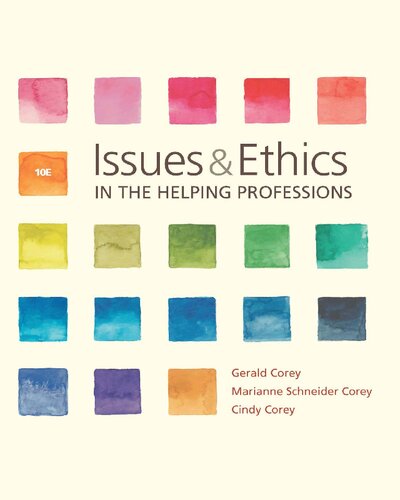Issues and Ethics in the Helping Professions 10th Edition by Gerald Corey 9780357670552 0357670558
$50.00 Original price was: $50.00.$25.00Current price is: $25.00.
Issues and Ethics in the Helping Professions 10th Edition by Gerald Corey – Ebook PDF Instant Download/Delivery:9780357670552,0357670558
Full dowload Issues and Ethics in the Helping Professions 10th Edition after payment
Product details:
ISBN 10:0357670558
ISBN 13:9780357670552
Author:Gerald Corey
Up-to-date and comprehensive, this practical best seller provides students with the basis for discovering their own guidelines for helping within the broad limits of professional codes of ethics and divergent theoretical positions. Respected authors Gerald Corey, Marianne Corey, and Cindy Corey raise what they consider to be central issues, present a range of diverse views on the issues, discuss their position, and provide opportunities for students to refine their thinking and develop an informed position. With new material in every chapter and an emphasis on critical thinking, ISSUES AND ETHICS IN THE HELPING PROFESSIONS, 10th Edition, is useful for students as well as practicing professionals.
Issues and Ethics in the Helping Professions 10th Table of contents:
Chapter 1. Introduction to Professional Ethics
The Focus of This Book
Some Suggestions for Using This Book
Professional Codes of Ethics
Common Themes of Codes of Ethics
Limitations of Codes of Ethics
Using Ethics Codes as Guides
Ethics Codes and the Law
Evolution of Ethics Codes
Professional Monitoring of Practice
Ethical Decision Making
Some Key Terms
Levels of Ethical Practice
Principle Ethics and Virtue Ethics
Moral Principles to Guide Decision Making
Steps in Making Ethical Decisions
Self-Assessment: An Inventory of Your Attitudes and Beliefs About Ethical and Professional Issues
A Suggestion for Using This Inventory
Chapter Summary
Suggested Activities
Ethics in Action Video Exercises
Chapter 2. The Counselor as a Person and as a Professional
Introduction
Self-Awareness and the Influence of the Therapist’s Personality and Needs
Motivations for Becoming a Counselor
Personal Problems and Conflicts
Personal Therapy for Counselors
Experiential Learning Toward Self-Understanding
Personal Therapy During Training
Ongoing Therapy for Practitioners
Transference and Countertransference
Transference: The “Unreal” Relationship in Therapy
Countertransference: Ethical Implications
Countertransference: Clinical Implications
Client Dependence
Delaying Termination as a Form of Client Dependence
Stress in the Counseling Profession
The Hazards of Helping
Stress Caused by Being Overly Responsible
Sources of Stress
Counselor Burnout and Impairment
Maintaining Vitality Through Self-Care
Chapter Summary
Suggested Activities
Ethics in Action Video Exercises
Chapter 3. Values and the Helping Relationship
Introduction
Controversies Regarding Integrating Personal Values With a Professional Identity
Clarifying Your Values and Their Role in Your Work
The Ethics of Imposing Your Values on Clients
Value Conflicts: To Refer or Not to Refer
Discriminatory Referrals
The Legal Framework Regarding Values Discrimination
State Legislation to Protect Religious Freedom
Informed Consent on Managing Personal Values
Seeking Supervision Regarding Your Values
Values Conflicts Regarding Sexual Attitudes and Behavior
Value Conflicts Pertaining to Abortion
Case Study of Other Possible Value Conflicts
Striving for Openness in Discussing Values
The Role of Spiritual and Religious Values in Counseling
Spiritual and Religious Values in Assessment and Treatment
Ethical and Clinical Considerations With Nonreligious Clients
Religious Teachings and Counseling
Personal Beliefs and Values of Counselors
An Ethical Decision-Making Process Model
Training in Dealing With Spiritual and Religious Concerns
Value Conflicts Regarding End-of-Life Decisions
Codes of Ethics Regarding End-of-Life Decisions
Role of Professionals in Helping Clients With End-of-Life Decisions
Chapter Summary
Suggested Activities
Ethics in Action Video Exercises
Chapter 4. Multicultural Perspectives and Diversity Issues
Introduction
The Problem of Cultural Tunnel Vision
The Challenges of Reaching Diverse Client Populations
Ethics Codes From a Diversity Perspective
Cultural Values and Assumptions in Therapy
Individualistic Versus Collectivistic Cultural Values
Challenging Stereotypical Beliefs and Cultural Bias
Examining Some Common Assumptions
Addressing Sexual Orientation
The Role of Counselor Educators and Therapists in Challenging “Isms”
Value Issues of Lesbian, Gay, Bisexual, and Transgender Clients
The Culture of Disability
The Disability Community
Ethical Concerns in the Role of Client Advocate
Matching Client and Counselor
Shared Life Experiences With Your Clients
How to Address Differences in Therapeutic Relationships
Addressing Unintentional Racism and Microaggressions
Increasing Your Sensitivity to Cultural Diversity
Multicultural Training for Mental Health Workers
Characteristics of the Culturally Skilled Counselor
Our Views on Multicultural Training
Chapter Summary
Suggested Activities
Ethics in Action Video Exercises
Chapter 5. Client Rights and Counselor Responsibilities
Introduction
The Client’s Right to Give Informed Consent
Legal Aspects of Informed Consent
Educating Clients About Informed Consent
Informed Consent and Managed Care
Informed Consent in Private Practice and Agency Settings
The Content of Informed Consent
The Therapeutic Process
Assessment of a Client’s Background
Background of the Therapist
Costs Involved in Therapy
The Length of Therapy and Termination
Consultation With Colleagues
Interruptions in Therapy
Benefits and Risks of Treatment
Informed Consent for the Provision of Psychological Services Using Telecommunication Technology
Alternatives to Traditional Therapy
Recording Therapy Sessions or Live Observations
Clients’ Right of Access to Their Files
Rights Pertaining to Diagnostic Classifying
The Nature and Purpose of Confidentiality
The Professional’s Responsibilities in Record Keeping
Record Keeping From a Clinical Perspective
Record Keeping From a Legal Perspective
Record Keeping for Managed Care Programs
Record Keeping for School Counselors
Securing Records Now and in the Future
Ethical Issues in Online Counseling
Ethics Codes and Technology
Emerging Issues in Online Counseling
Advantages and Disadvantages of Online Counseling
Legal Issues and Regulation of Online Counseling
Use of Smartphones
Competent Counseling Online
Our Perspective on Online Counseling
Working With Children and Adolescents
Parental Right to Information About a Minor’s Treatment
School Counseling and Parental Consent
Seeing Minors Without Parental Consent
Informed Consent Process With Minors
Involving Parents in the Counseling Process With Minors
Ethical and Legal Challenges Pertaining to Confidentiality With Minors
Counseling Reluctant Children and Adolescents
Specialized Training for Counseling Children and Adolescents
Dealing With Suspected Unethical Behavior of Colleagues
Malpractice Liability in the Helping Professions
What Is Malpractice?
Reasons for Malpractice Suits
Risk Management Strategies
Course of Action in a Malpractice Suit
Legal Liability in an Ethical Perspective
Chapter Summary
Suggested Activities
Ethics in Action Video Exercises
Chapter 6. Confidentiality: Ethical and Legal Issues
Introduction
Confidentiality, Privileged Communication, and Privacy
Confidentiality
Privileged Communication
Privacy
Confidentiality and Privacy in a School Setting
Ethical and Legal Ramifications of Confidentiality and Privileged Communication
Privacy Issues With Telecommunication Devices
Implications of HIPAA for Mental Health Providers
The Duty to Warn and to Protect
The Duty to Protect Potential Victims
Implications of Landmark Court Cases
Guidelines for Dealing With Dangerous Clients
Implications of Duty to Warn and to Protect for School Counselors
The Duty to Protect Suicidal Clients
Ethical Issues in Assessing and Treating Nonsuicidal Self-Injury
School Counselor Liability for Student Suicide
Guidelines for Assessing Suicidal Behavior
Protecting Children, the Elderly, and Dependent Adults from Harm
Confidentiality and HIV/AIDS-Related Issues
Ethical and Legal Considerations in AIDS-Related Cases
Chapter Summary
Suggested Activities
Ethics in Action Video Exercises
Chapter 7. Managing Boundaries and Multiple Relationships
Introduction
The Ethics of Multiple Relationships
Differing Perspectives on Multiple Relationships
Factors to Consider Before Entering Into a Multiple Relationship
Boundary Crossings Versus Boundary Violations
The Changing Perspectives on Nonsexual Multiple Relationships
Perspectives on Boundary Issues
Advantages of Boundary Crossings
Managing Multiple Relationships in a Small Community
Coping With Challenges of Practice in Rural Communities
Minimizing Risks of Practicing in Small Communities
Practicing Ethically in a Small Community
Bartering for Professional Services
Ethical Standards on Bartering
Making a Decision About Bartering
Giving or Receiving Gifts
Social Relationships With Clients
Cultural Considerations
Forming Social Relationships With Former Clients
Sexual Attractions in the Client–Therapist Relationship
Educating Counselor Trainees
Suggestions for Dealing With Sexual Attractions
Sexual Relationships in Therapy: Ethical and Legal Issues
Ethical Standards on Sexual Contact With Clients
The Scope of the Problem
Harmful Effects of Sexual Contact With Clients
Legal Sanctions Against Sexual Violators
Assisting Victims in the Complaint Process
Sexual Relationships With Former Clients
Transforming a Professional Relationship Into a Personal Relationship
A Special Case: Nonerotic Touching With Clients
Ethical and Clinical Considerations of Nonsexual Touch in Therapy
Chapter Summary
Suggested Activities
Ethics in Action Video Exercises
Chapter 8. Professional Competence and Training
Introduction
Therapist Competence: Ethical and Legal Aspects
Perspectives on Competence
Assessment of Competence
Making Referrals
Ethical Issues in Training Therapists
Selection of Trainees
Content of a Program
Training Practitioners to Work in a Digital Culture
Evaluating Knowledge, Skills, and Personal Functioning
Evaluation Criteria and Procedures
Evaluation of Interpersonal Behavior and Personal Characteristics
Systematic Procedures in Evaluation of Student Performance
Gatekeeper Role of Faculty in Promoting Competence
Dismissing Students for Nonacademic Reasons
Legal Deterrents to Dismissing Students
Court Cases on Dismissing Students From a Program
Professional Licensing and Certification
Purposes of Legislative Regulation of Practice
Continuing Professional Education and Demonstration of Competence
A Lifelong Commitment to Maintaining Competence
Review, Consultation, and Supervision by Peers
Chapter Summary
Suggested Activities
Ethics in Action Video Exercises
Chapter 9. Ethical Issues in Supervision
Introduction
Ethical Issues in Clinical Supervision
Informed Consent in Supervision
Responsibilities of Supervisees
The Supervisor’s Roles and Responsibilities
Supervisor Responsibilities to Supervisees and Their Clients
Methods of Supervision
Philosophy and Styles of Supervision
Ethical and Effective Practices of Clinical Supervisors
Competence of Supervisors
The Problem of Supervisor Incompetence
Legal Aspects of Supervision
Ethical Issues for Online Supervision
Special Issues in Supervision for School Counselors
Multicultural and Diversity Issues in Supervision
Racial and Ethnic Issues
Spiritual Issues in Supervision
Gender Issues in Supervision
Multiple Roles and Relationships in the Supervisory Process
Sexual Intimacies During Professional Training
Ethical Issues in Combining Supervision and Counseling
Educators and Supervisors Who Counsel Students
Chapter Summary
Suggested Activities
Ethics in Action Video Exercises
Chapter 10. Issues in Theory and Practice
Introduction
Developing a Counseling Style
The Division of Responsibility in Therapy
Deciding on the Goals of Counseling
The Use of Techniques in Counseling
Assessment and Diagnosis as Professional Issues
Theoretical Perspectives on Assessment and Diagnosis
DSM-5 Assessment
The Case For Psychodiagnosis
The Case Against Psychodiagnosis
Our Position on Assessment and Psychodiagnosis
Diagnosis Within an Insurance Context
Ethical and Legal Issues in Diagnosis
Cultural Issues in Assessment and Diagnosis
Using Tests in Counseling
Evidence-Based Therapy Practice
Findings From Psychotherapeutic Research
Chapter Summary
Suggested Activities
Chapter 11. Ethical Issues in Couples and Family Therapy
Introduction
The Systems Theory Perspective
Ethical Standards in Couples and Family Therapy
Responsibility to Clients
Confidentiality
Professional Competence and Integrity
Responsibility to Students and Supervisees
Research and Publication
Technology-Assisted Professional Services
Professional Evaluations
Financial Arrangements
Advertising
Special Ethical Considerations in Working With Couples and Families
Informed Consent in Couples and Family Therapy
Contemporary Professional Issues
Personal Characteristics of the Family Therapist
Educational Requirements for Family Therapy
Experiential Qualifications for Family Therapy
Values in Couples and Family Therapy
Gender-Sensitive Couples and Family Therapy
Feminist Perspective on Family Therapy
A Nonsexist Perspective on Family Therapy
Responsibilities of Couples and Family Therapists
Therapist Responsibilities in Counseling Couples
Therapist Responsibilities in Intimate Partner Violence
Confidentiality in Couples and Family Therapy
Differing Perspectives on Confidentiality with Multiple Clients
Chapter Summary
Suggested Activities
Chapter 12. Ethical Issues in Group Work
Introduction
Ethical Issues in Training and Supervision of Group Leaders
Our Views on the Ethical Training of Group Workers
Ethical Issues in the Diversity Training of Group Workers
Social Justice Practice and Training in Group Work
Guidelines for Multicultural and Social Justice Competence
Ethical Considerations in Coleadership
Ethical Issues in Forming and Managing Groups
Screening and Selection of Group Members
Preparing Group Participants
Involuntary Participation
Freedom to Withdraw From a Group
Psychological Risks
Confidentiality in Groups
Exceptions to Confidentiality in Groups
Social Media in Group Work: Confidentiality and Privacy Considerations
Ethical Issues Concerning Termination
The Termination Phase in a Closed Group
Termination of Members in an Open Group
Follow-Up and Evaluation
How to Determine What Works in a Group
Evidence-Based Practice in Group Work
An Alternative: The Practice-Based Approach to Group Work
Chapter Summary
Suggested Activities
Chapter 13. Community and Social Justice Perspectives
Introduction
Making a Difference in the Community
The Community as Client
Why a Community Perspective Is a Concern for Counselors
Ethical Practice in Community Work
The Community Mental Health Orientation
Types of Client and Community Interventions
Social Justice Perspective
Social Justice Advocacy as an Ethical Mandate
The Goals of Social Justice and Advocacy
Advocacy Competencies
Social Justice Advocacy in School Counseling
Roles of Helpers Working in the Community
Outreach Interventions
Alternative Counselor Roles
Educating the Community
Influencing Policymakers
Promoting Change in the Community
A Developmental Versus a Service Approach
Ways to Involve Yourself in the Community
Working Within a System
The Challenge of Maintaining Integrity in an Agency Environment
Being an Advocate and Working in a System
Relationships Between Community Worker and Agency
Chapter Summary
Suggested Activities
Authors’ Concluding Commentary
Part 1. Ethical Decision Making
How To Think About Ethics
Self-Inventory to Complete Before Viewing Part One of the Video
Ethical Decision Making
Ethics Codes on Multicultural Awareness and Competence
Becoming a Multiculturally Competent Practitioner
Assessment of Beliefs and Attitudes of Multiculturally Competent Practitioners
Assessment of Knowledge of Multiculturally Competent Practitioners
Assessment of Skills and Intervention Strategies of Multiculturally Competent Practitioners
Follow-Up Self-Inventory
Part 2. Values and the Helping Relationship
Self-Inventory to Complete Before Viewing Part Two of the Video
Where Do You Stand?
Value Conflicts
In What Situations are you Most Likely to Experience a Value Conflict?
Follow-Up Self-Inventory
Part 3. Boundary Issues and Multiple Relationships
Self-Inventory to Complete Before Viewing Part Three of the Video
Boundary Issues in Perspective
Managing Boundaries
To Barter or Not to Barter?
Accepting a Gift From a Client?
Follow-Up Self-Inventory
Some Final Thoughts
Where Are You Now and Where Will You Go From Here?
References and Suggested Readings
People also search for Issues and Ethics in the Helping Professions 10th
ssues and ethics in the helping professions 10th edition pdf
issues and ethics in the helping professions 10th edition ebook
issues and ethics in the helping professions 10th ed
issues and ethics in the helping professions 10th edition citation
issues and ethics in the helping professions 10th edition online
Tags:
Gerald Corey,Helping,Professions,Ethics
You may also like…
Medicine - Medicine & Nursing Reference
Key Concepts and Issues in Nursing Ethics 1st Edition P. Anne Scott
Politics & Philosophy - Major Branches of Philosophical Study
Politics & Philosophy - Anthropology
Ethics theory and contemporary issues Ninth Edition Fiala 9781305958678, 1305958675
Business & Economics - Management & Leadership













